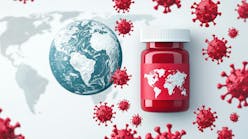WHO experts to consider emergency status as more nations affected
The World Health Organization (WHO) announced that its novel coronavirus (2019-nCoV) emergency committee will meet again to assess if outbreak developments warrant a public health emergency of international concern (PHEIC), as China reported more than 1,400 new cases, and the United Arab Emirates (UAE) and Finland report their first cases.
The announcement comes a day after top WHO officials returned from meeting with China's president and health minister. At a media briefing, Mike Ryan, MD, said the WHO is restarting emergency talks due to China's ongoing surge of cases and evidence of human-to-human spread outside of China.
Ryan, who as the WHO executive director of health emergencies was part of the WHO delegation that traveled to China this week, said he was impressed with the engagement of the Chinese government in responding to the outbreak. "I've never seen a scale of commitment at this level."
He added that the goal of a WHO-led expert joint mission that is set to visit China, which was announced yesterday, is to gain a better common understanding of the outbreak alongside Chinese colleagues.
The outbreak is at an important juncture, Ryan said, adding that he believes that transmission chains can still be interrupted.
A PHEIC, if the committee recommends one and the WHO's director-general declares one, can help countries coordinate their public health measures to minimize the spread of the virus and also minimize the impact on travel and trade. The committee's reconsideration of the events comes as some airlines began suspending flights to and from China, such as Southeast Asia-based Lion Air Group and British Airways, according to an Agence France Presse (AFP) story. Some airlines, such as Cathay Pacific, have scaled back their flights due to low demand.
The emergency committee meeting will be the third since the outbreak was announced. In split decisions last week, the group held off in recommending a PHEIC to gather more information. In its first meeting, on January 22, the experts decided to wait a day before reconvening on January 23.
Tedros Adhanom Ghebreyesus, PhD, the WHO's director-general, said he wishes the emergency committee had an option for making an intermediate recommendation, short of a full PHEIC. He said discussions are under way into a more tiered public health emergency approach, a topic raised during earlier global outbreaks.
In other WHO developments, the group said it launched a private-public collaboration called "The Pandemic Supply Chain Network," an effort to gather information about market capacity and risk assessment for personal protective equipment in order to match demand with supply. It hopes to complete the assessment by February 5. The WHO detailed the new effort in its daily situation report.
The WHO also launched a clinical database platform to allow countries to contribute clinical data in a standardized way, which will help gather information about patients for guiding medical treatment and public health measures.




